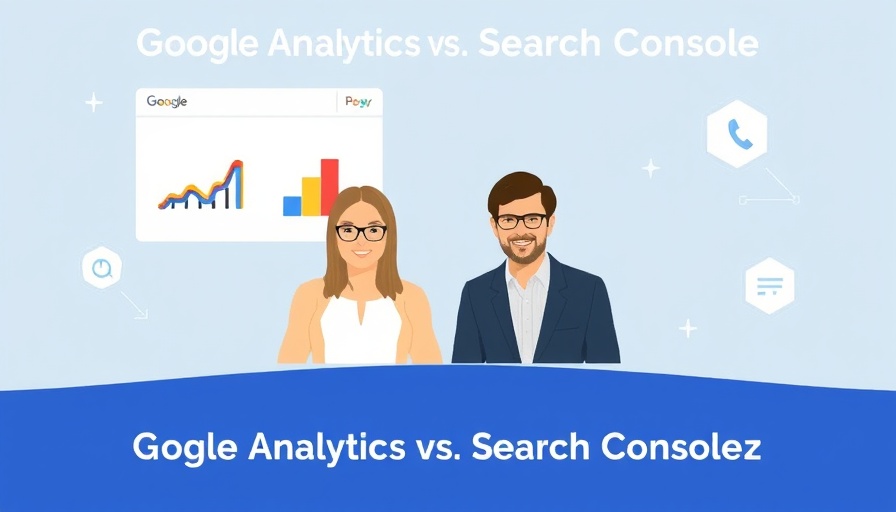
Understanding the Differences: Google Search Console vs. Google Analytics
When we dive into the world of online marketing, especially for affiliate marketers who are keen to squeeze every penny from their traffic, understanding the tools at our disposal can make all the difference. Google Search Console and Google Analytics are two powerful allies that can help us navigate this digital landscape. But do you know how they differ?
In 'Demystifying Google Analytics and Search Console data,' the discussion dives into the key differences and similarities of these essential tools, which sparked deeper analysis on our end.
The Unique Strengths of Each Tool
Google Search Console is like your cozy coffee shop before the customers arrive — it's all about who shows up in the first place. Here, you can find out how well your website is performing in Google search results: the number of times it shows up, the clicks it garners, and the magic words people are using to find you. It's solely focused on how your website interacts with Google's search engine.
On the other hand, Google Analytics is the bustling little café during peak hours — it tells you what your customers are doing once they sit down. Want to know how long they stay? Which menu items (or pages) they prefer? You got it! This tool measures user behavior, showing you what visitors do on your site, their journey, and the effectiveness of your marketing traffic channels.
Connecting the Dots Between Tools
What’s exciting is that you don't have to use these tools in isolation. You can link your Search Console to Google Analytics to create a superhero version of data analysis. When you connect them, you get access to reports that let you compare organic search data straight from Google Analytics!
Imagine being able to gauge how well your landing pages are performing in drawing in organic traffic, or better yet, understanding if those visitors convert into leads or sales. That, dear friends, is how you build a killer affiliate business!
Data Discrepancies: Don’t Panic!
Now, let’s tackle the elephant in the room — discrepancies! You might notice that the clicks reported in Search Console don't quite match the sessions in Google Analytics, and that's perfectly normal because, as they say, “One man’s click is another man’s session!”
An important distinction lies in how these metrics are defined. A search click refers to someone clicking your link in a Google search, while a session in Google Analytics encompasses any collection of interactions a user has on your site within a specific timeframe. So, it’s no wonder the numbers don’t always match up perfectly!
Taking Action: Optimize Your Efforts
By utilizing both tools, you can optimize your affiliate marketing efforts like a pro. Monitor both the pre-visit data from Search Console and the post-visit behavior in Google Analytics. This comprehensive approach allows you to improve your landing page optimization, tweak email marketing strategies, and create high-converting lead magnets that resonate with your audience.
Creative Lead Magnet Ideas to Boost Your List
Have you been pondering over how to grow your email list? Why not whip up some enticing lead magnets? Here are a few ideas to inspire you:
- Free eBook Opt-In: Share valuable insights on affiliate marketing strategies.
- PDF Checklist Lead Magnet: Create a checklist for new affiliate marketers to streamline their efforts.
- Webinar Signups: Host a live session discussing how to integrate Search Console with Analytics effectively.
- Free Mini-Course: Offer short email-based courses on improving SEO skills.
These ideas can help increase subscribers and enrich your email list faster than you can say 'email capture forms.'
Final Thoughts: It’s All About Growth
Utilizing both Google Search Console and Analytics can help you make smarter, data-driven decisions. This thorough approach feeds your affiliate marketing strategy—allowing you to fine-tune your techniques, grow your email list, and ultimately increase your conversions. Remember, whether it’s through insightful data analysis or creating irresistible offers, the goal is to convert visitors into subscribers and subscribers into customers!
Now that you're armed with knowledge, go ahead and monitor your analytics, optimize those landing pages, and watch as your email marketing efforts blossom! And hey, why don’t we end it with a little humor? Affiliate marketing is like a jellybean — it’s sweet if you know how to pick the right flavors!
 Add Row
Add Row  Add
Add 




 Add Row
Add Row  Add
Add 

Write A Comment